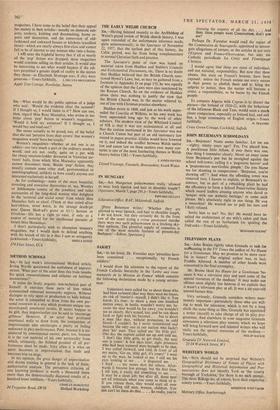SIR,—What would be the public opinion of a judge who
said : 'Would the evidence clear the accused? If I thought so, I would listen to. it'? How can one, then, regard Miss Rose Macaulay, who writes in her letter about 'pop' fiction in women's magazines : 'Would it hold my attention? If 1 thought so, I would buy and read one'?
She seems actually to be proud, too, of the belief that she can 'perceive from their covers' that women's magazines would 'bore her totally' Women's magazines—whether or not one is an addict—are very much a part of the ordinary modern world, and are not, really, quite on a par with the cheap emotion-fodder devoured in Victorian ser- vants' halls, from which Miss Macaulay apparently cannot disconnect them. Beside 'pop' fiction, they usually contain some other stuff, gastronomical or autobiographical, unlikely to bore totally anyone not interested exclusively in herself.
As for archeology—some of the most beautiful, revealing and evocative discoveries of, say, Woolley or Schliemann consist of the jewellery and 'toilet accessories of the long-dead women who delighted in the 'sartorial and social scene' from which Miss Macaulay feels so aloof. (Think of that coiled silver hair-ribbon, never worn, in the strange death-pit near Queen Shub-ad's grave at Ur!) Serious or frivolous—life has a right to exist, if only as a source of material for the intellectual pursuits of future Miss Macaulays.
I don't particularly wish to champion women's magazines, but I would dash to defend anything with the breath of life in it that I saw so arrogantly
jackbooted.—Yours faithfully, SHIELA STEEN


































 Previous page
Previous page